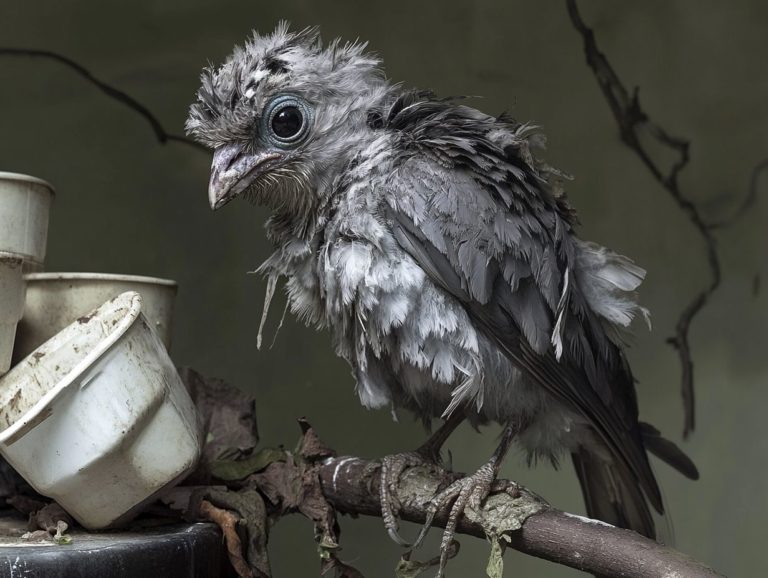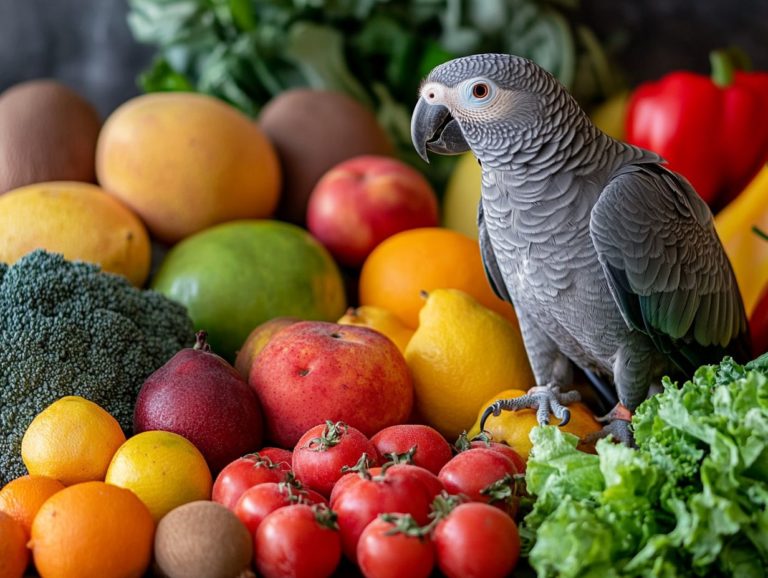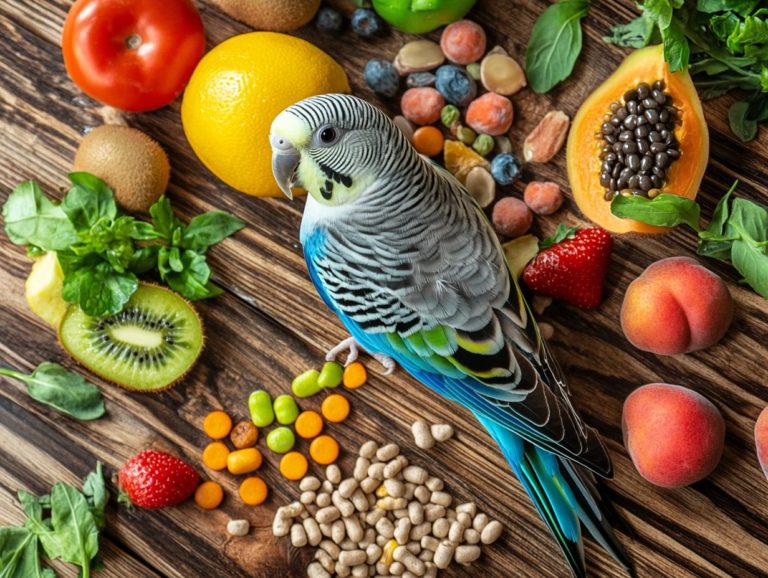Understanding Bird Food Allergies
Bird food allergies can be a subtle yet significant concern for your feathered companions. They can lead to discomfort and various health issues.
Just like in humans, allergies can stem from specific ingredients in a bird’s diet. This can result in a range of symptoms that might easily go unnoticed. This article delves into what bird food allergies are, their common causes, and the signs to watch for during an allergic reaction.
You’ll find guidance on how to diagnose these allergies, effective treatment options, and proactive strategies for prevention. Whether you re a seasoned bird owner or new to caring for birds, understanding these allergies is crucial for the health and happiness of your cherished pets.
Contents
Key Takeaways:
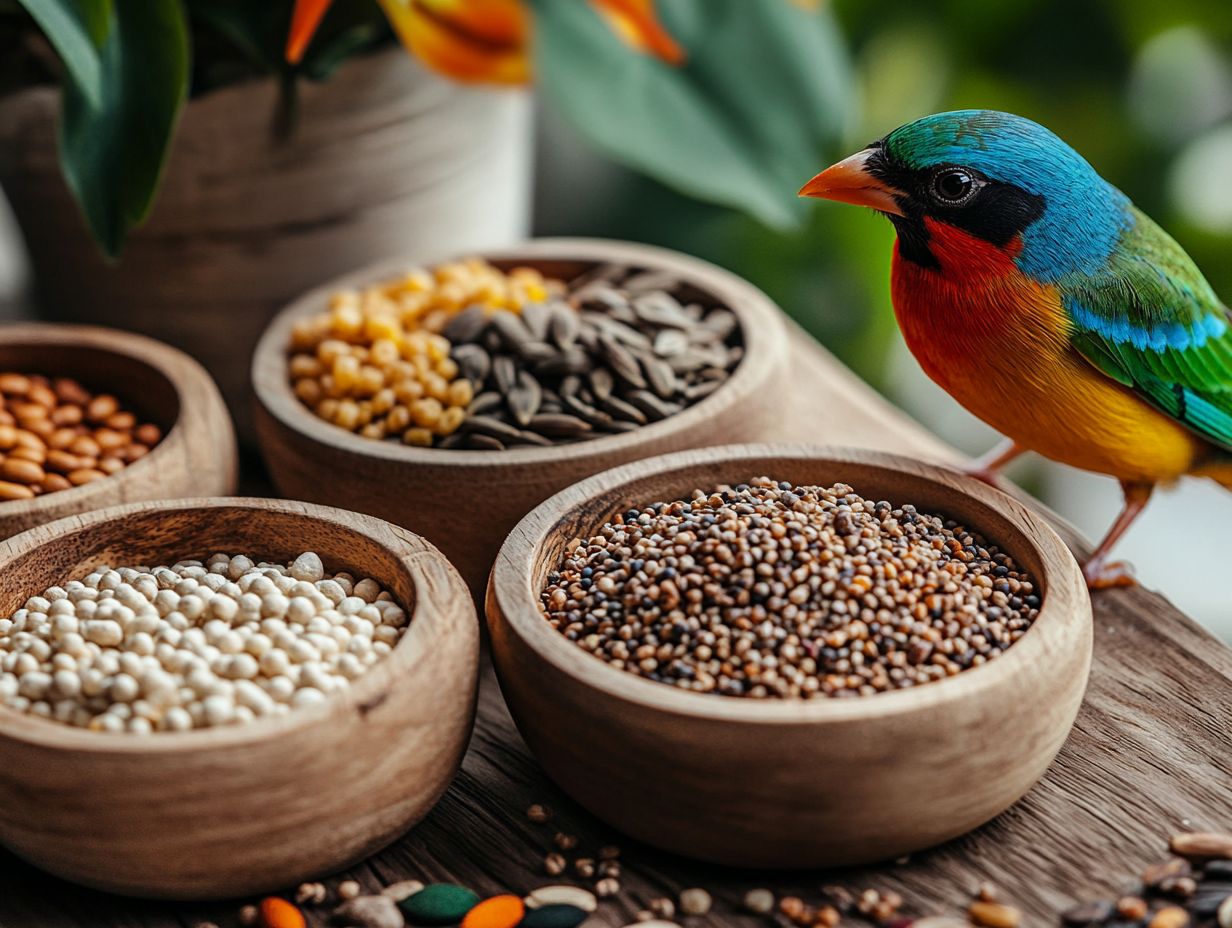
- Bird food allergies are an adverse immune response to certain foods commonly consumed by birds.
- Symptoms can include skin irritation, respiratory distress, and gastrointestinal upset.
- Diagnosis involves a series of tests to identify the specific allergen, and treatment options include medication and management strategies.
What are Bird Food Allergies?
Bird food allergies are becoming an increasingly important concern for pet owners. These allergies occur when the immune system of birds such as parrots, parakeets, and canaries reacts negatively to certain ingredients in their food. The resulting reactions can manifest as various symptoms that may impact the health and well-being of your feathered companions.
Understanding the allergens involved and the management strategies available is essential for bird owners. By identifying common causes and recognizing symptoms, you can take steps to create a healthier environment for your cherished pet birds.
Definition and Common Causes
Bird food allergies happen when your feathered friend’s immune system mistakenly identifies specific proteins or substances in food as harmful, triggering a reaction.
This reaction can lead to various symptoms, including itching, inflammation, and gastrointestinal distress. Common allergens in pet food often include proteins like chicken, soy, or wheat, as well as fillers and artificial additives. Many birds can have adverse reactions to these ingredients, jeopardizing their health and possibly leading to chronic issues if not addressed.
Recognizing these allergens early is vital, as it allows you to make informed dietary choices that enhance your bird’s well-being and prevent adverse reactions.
Symptoms of Bird Food Allergies
Recognizing the symptoms of bird food allergies is crucial for pet owners. Timely care and management can make all the difference. Common allergy symptoms can include respiratory issues, such as wheezing or coughing, and skin irritations like eczema.
In more severe cases, your bird may experience conditions like hypersensitivity pneumonitis. Staying vigilant about these signs facilitates accurate diagnosis and significantly contributes to the overall health and well-being of your beloved pet birds.
Recognizing Allergic Reactions
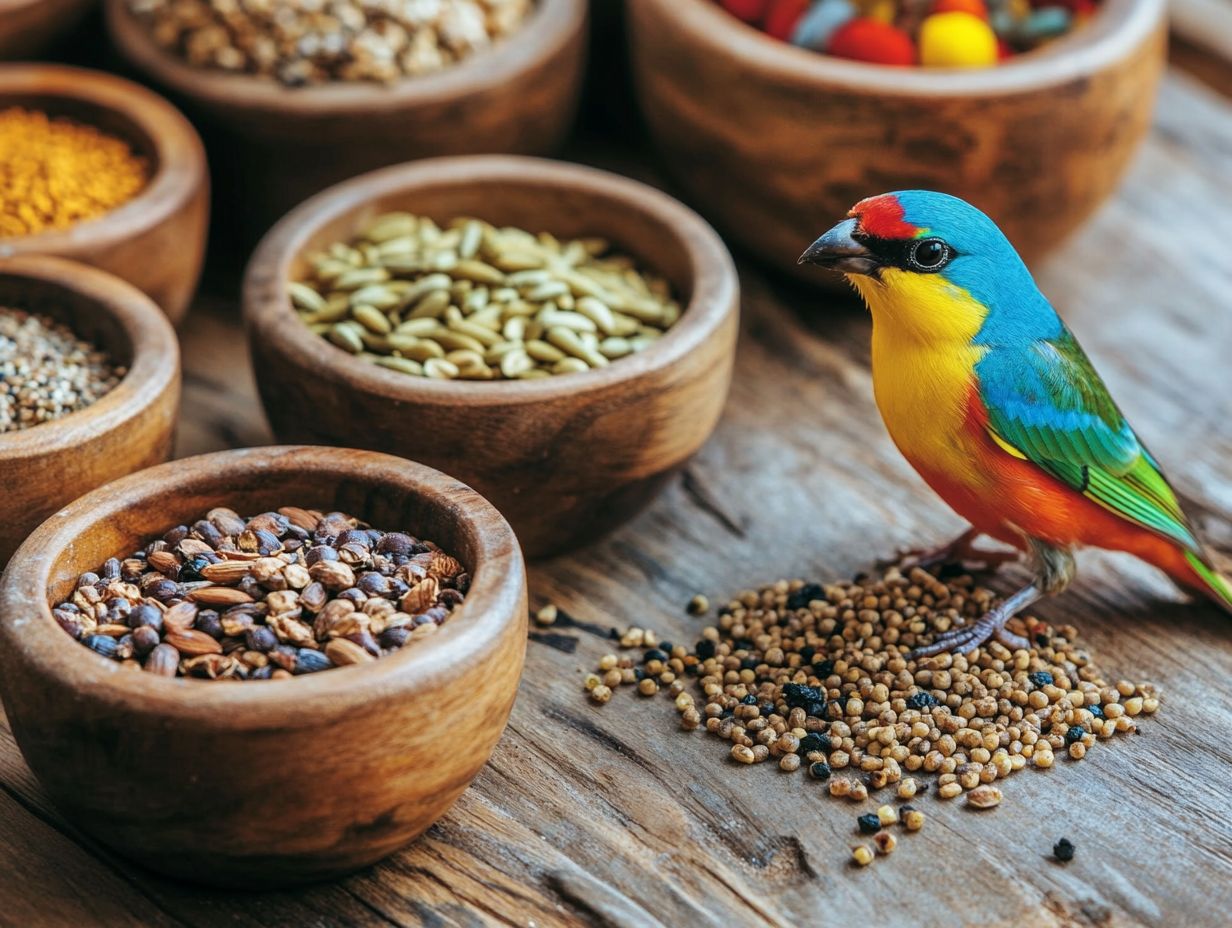
Recognizing allergic reactions in birds can be challenging, as symptoms vary between species and individual birds.
For instance, while a parrot may show signs of itching and feather plucking, a canary might exhibit changes in vocalization or increased lethargy. Physical symptoms like nasal discharge or swollen eyes are also indicators of an allergic response. Observing these behaviors is essential, as a delayed response to allergens can lead to serious health issues.
As a bird owner, paying attention to even the most subtle changes in your pet’s behavior or appearance is crucial. Early detection can dramatically improve outcomes, ensuring you take the right measures to care for your feathered companions.
If you suspect your bird has an allergy, consult a veterinarian for guidance and support.
Summary: Understanding bird food allergies is vital for the health and happiness of your pets. Be vigilant in recognizing symptoms and allergens, and seek professional help if needed.
Diagnosing Bird Food Allergies
Diagnosing bird food allergies requires employing a range of allergy testing methods to pinpoint the specific allergens impacting your pet bird’s health. Common procedures include skin allergy tests and blood allergy tests that assess the levels of Immunoglobulin E (IgE), a substance in the blood that shows if your bird has allergies.
Consulting with a healthcare provider who specializes in avian medicine is essential for ensuring an accurate diagnosis. They can help develop personalized treatment plans for your affected feathered friend.
Tests and Procedures for Diagnosis
Several tests are available to help diagnose bird food allergies, with the skin prick test being one of the most common methods for pinpointing specific allergens.
This test involves exposing your bird s skin to tiny amounts of potential allergens and monitoring for reactions, such as swelling or redness. Another effective approach is the blood test, which measures specific antibodies in response to allergens, offering a broader perspective on your bird s sensitivities.
You might also consider implementing elimination diets, where certain foods are temporarily removed from your bird’s diet to see if symptoms improve. It’s crucial to work with a knowledgeable healthcare provider throughout this process to ensure accurate diagnosis and proper management of allergic reactions, ultimately enhancing your bird’s health and well-being.
Treatment for Bird Food Allergies
Treating bird food allergies often involves several steps to manage the condition. This may include administering antihistamines to alleviate symptoms and considering treatment to build tolerance to allergens.
Nasal corticosteroids can help manage inflammation, allowing your pet bird to enjoy a more comfortable life despite their allergies. An integrated treatment plan is crucial for ensuring the long-term health and well-being of birds suffering from food allergies.
Medications and Management Strategies
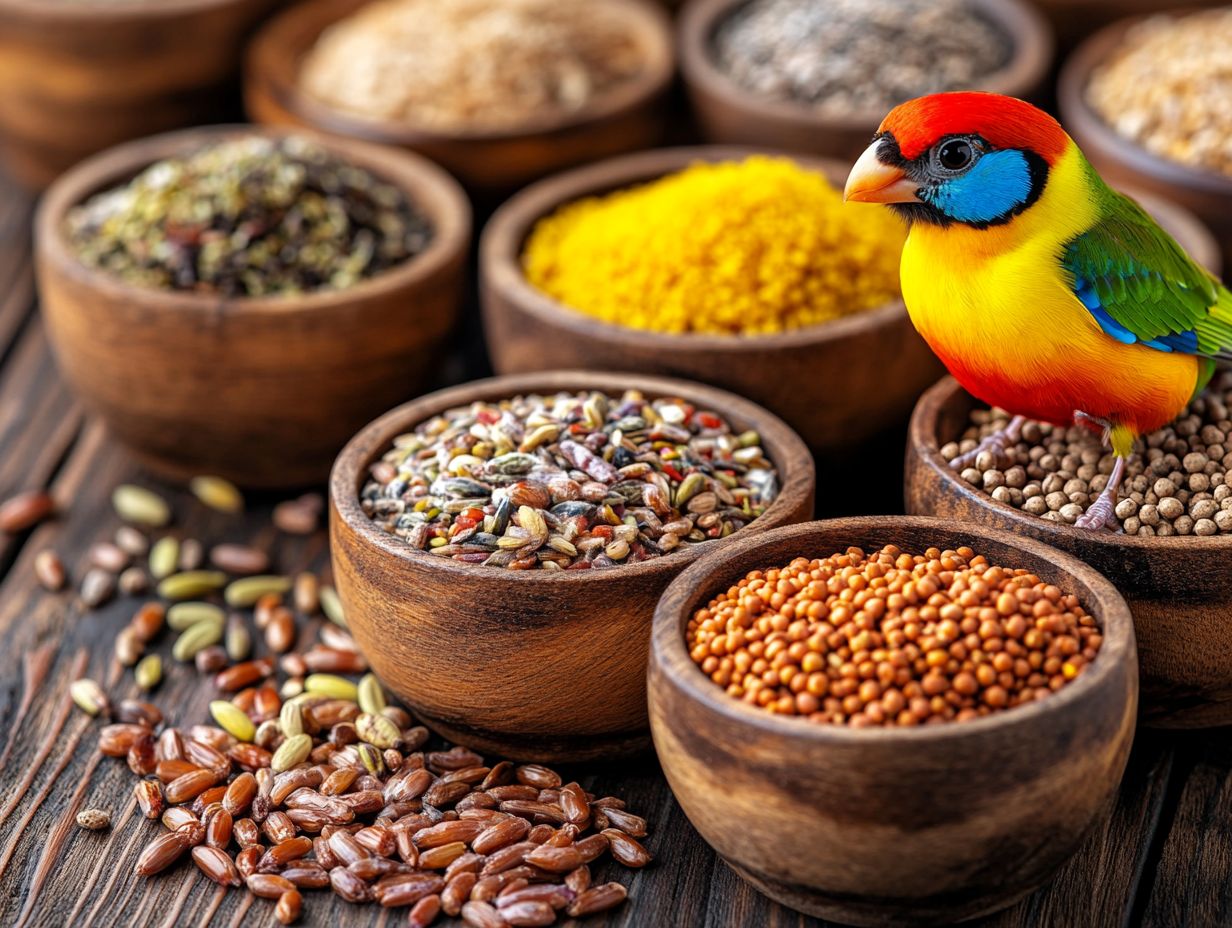
Medications like antihistamines and nasal corticosteroids are often your go-to options for treating bird food allergies. They provide much-needed symptomatic relief and help reduce inflammation.
These medications block histamine, easing bothersome symptoms such as itching, sneezing, and nasal congestion. Alongside antihistamines, leukotriene inhibitors may also be recommended, as they assist in managing pesky asthma-like symptoms that can accompany allergies.
While these treatments are generally effective, it’s vital to be aware of potential side effects. Some antihistamines might make your bird drowsy, and long-term use of corticosteroids could increase susceptibility to infections.
For long-term relief, consider allergen-specific immunotherapy, which gradually desensitizes your bird to specific allergens. This improves overall tolerance and reduces the severity of allergic reactions over time.
Regular consultations with an allergist are essential to tailor treatment plans and monitor any adverse effects, ensuring you’re on the right track.
Preventing Bird Food Allergies
Take action to reduce allergen exposure and maintain a pristine environment for your pet birds.
Establishing regular cleaning routines and utilizing air purification systems can significantly diminish airborne allergens and particulates, creating a healthier living space.
By prioritizing cleanliness and staying vigilant, you can effectively protect your feathered companions from developing food allergies.
Strategies for Avoiding Allergens
To effectively avoid allergens that could trigger bird food allergies, you should adopt a variety of strategies designed to minimize allergen exposure in your birds’ environment.
Start by carefully selecting pet food and bird seed specifically formulated to reduce allergy risks think limited ingredient or hypoallergenic options. Maintaining a rigorous cleaning routine in your birds’ living space is essential. Frequently wash their cages, dishes, and toys to eliminate any leftover food particles or dust that might harbor allergens.
You should consider using air purifiers and ensuring proper ventilation to further enhance the well-being of your feathered companions. By using these strategies, you can create a safer and more comfortable habitat for your birds.
Frequently Asked Questions
What are bird food allergies, and how do they affect my pet?
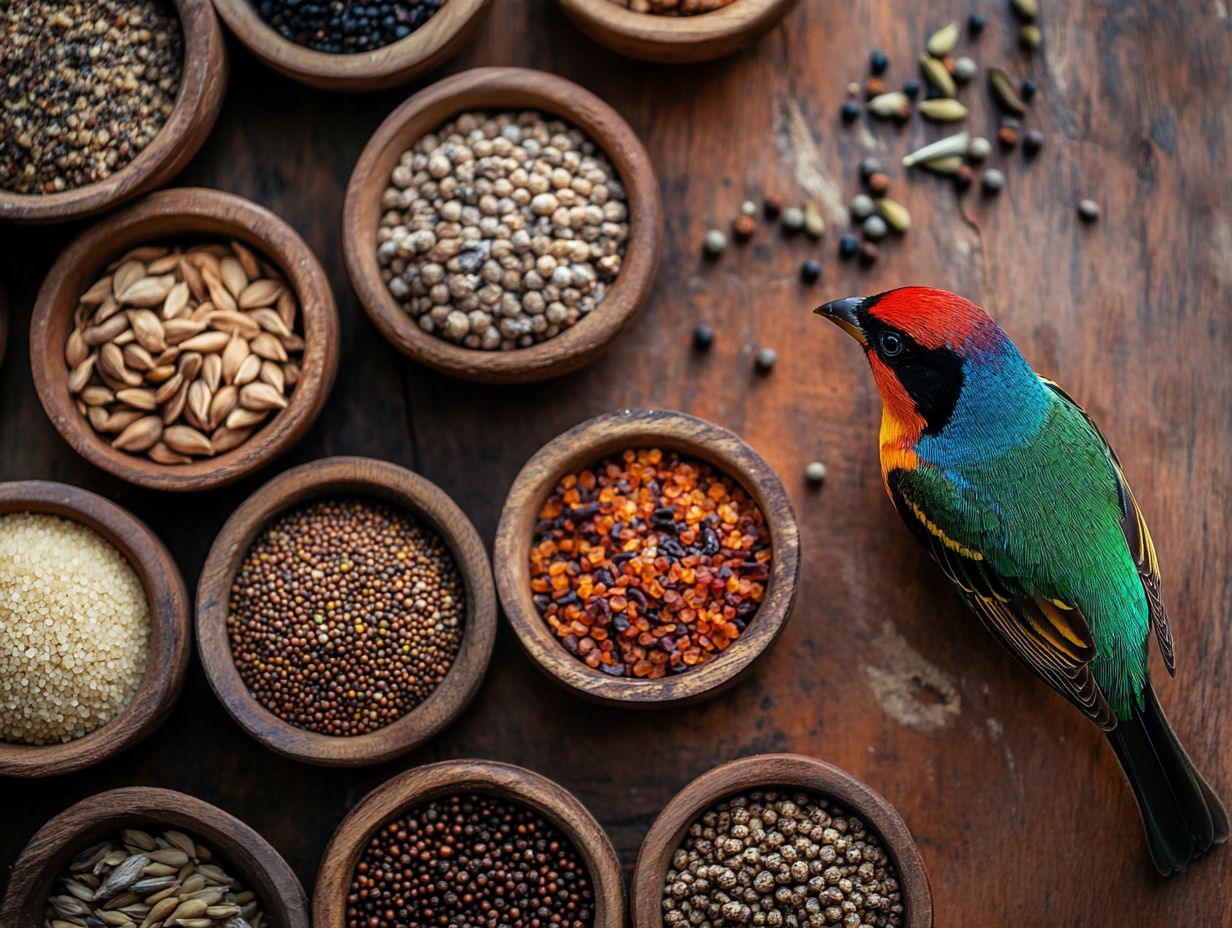
Bird food allergies are a type of allergic reaction that occurs when a bird’s immune system reacts negatively to certain ingredients found in their food.
What are some common symptoms of bird food allergies?
Some common symptoms include sneezing, coughing, wheezing, diarrhea, and vomiting. These symptoms can also be associated with allergic asthma.
What are the most common food allergens for birds?
The most common food allergens for birds include peanuts, tree nuts, eggs, dairy products, and certain grains.
Can bird food allergies be prevented?
Yes, bird food allergies can be prevented by carefully monitoring your bird’s diet and avoiding known allergens.
How are bird food allergies diagnosed?
Bird food allergies are typically diagnosed through a process of elimination. Potential allergens are removed from the bird’s diet and then slowly reintroduced to determine the specific trigger.
What should I do if my bird has a food allergy?
If you suspect that your bird has a food allergy, it is very important to consult with a veterinarian for proper diagnosis and treatment. They may recommend an elimination diet or prescribe medication to manage symptoms.
Don t wait! Consult a vet if you suspect your bird has an allergy. Make sure to keep your birds’ environment allergen-free for their health and happiness!

